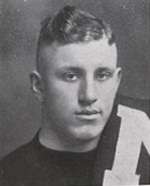William R. Lyman
 | |
| Date of birth | November 30, 1898 |
|---|---|
| Place of birth | Table Rock, Nebraska, United States |
| Date of death | December 28, 1972 (aged 74) |
| Place of death | Barstow, California, United States |
| Career information | |
| Position(s) | Tackle |
| College | Nebraska |
| Career history | |
| As player | |
| 1922–1923 | Canton Bulldogs |
| 1924 | Cleveland Bulldogs |
| 1925 | Canton Bulldogs |
| 1925 | Frankford Yellow Jackets |
| 1926–1934 | Chicago Bears |
| Career highlights and awards | |
| |
| Career stats | |
| |
William Roy "Link" Lyman (November 30, 1898 – December 28, 1972) was a professional American football player. He played tackle for the Canton Bulldogs, the Cleveland Bulldogs, the Frankford Yellow Jackets and the Chicago Bears.
Lyman was recruited out of the University of Nebraska by Guy Chamberlin, to play for the Canton Bulldogs in 1922. Playing alongside Pete Henry and Chamberlin, Lyman helped make Canton the first true professional football powerhouse, with a 10-0-2 record that season. They would have another undefeated season in 1923, but when the Canton franchise was sold after the 1923 season, Lyman and many other players moved to Cleveland, Ohio, where Lyman signed with the Cleveland Bulldogs. In 1924 Lyman would help the Cleveland Bulldogs win the championship. In 1925 Lyman played half seasons with two teams, the new Canton franchise and the Frankford Yellowjackets.
Joining the Chicago Bears after the 1925 season, he took part in the football barnstorming tour that featured football player Red Grange. He remained with the Bears for the rest of his career, helping the Bears win the championship in 1933, and the divisional title in 1934, after which he retired. Many professional football historians credit Lyman with developing the "shifting and sliding" ploy used by many defensive linemen today. In shifting while on the line he confused his opponents, and it helped him become one of the most respected players of his era. Including high school and his sixteen years of college and professional football, Lyman only experienced one losing season. After Lyman retired, coach George Halas once commented that Lyman had been stronger and tougher in his last two seasons than when he first joined the organization eight years earlier. Lyman was elected to the Pro Football Hall of Fame in 1964.